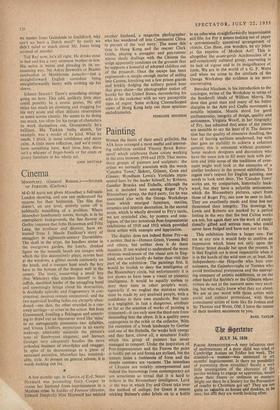Cinema
Moore',Leer. (General Release.)--,-SOLD1ER OF FORTUNE. (Carlton.) M-G-M HAVE not given Moon fleet a full-scale London showing, and one can understand the reasons for their hesitation. The film that doesn't, on any level, entirely come off is habitually something of a problem. Where Moon fleet handsomely scores, though, is in its atmospheric backgrounds, the fine flavour of Gothic romance that John Houseman and Fritz Lang, the producer and director, have ex- tracted from J. Meade Faulkner's story of smugglers in eighteenth-century Dorsetshire. The skull in the crypt, the headless statue in the overgrown garden, the lonely, cloaked figure on the moonlit beach are images with which the film decoratively plays; storms beat at the windows, a gibbet stands ominously on the heath, and a treasure hunt sends the boy hero to the bottom of the deepest well in the county. The story, concerning a small boy (Jon Whiteley) who attaches himself to the raffish, dandified leader of the smuggling band and unwittingly brings about his destruction, is decidedly episodic and fragmentary in con- struction; motives remain conjectural; and the two equivocal leading ladies are abruptly aban- doncd—one shot, the other stranded in a run- away carriage—at crises in the action. But Joan Greenwood, fondling a Pekingese and contriv- ing to drawl out an innocuous word like 'mine' to an outrageously possessive two syllables, and Viveca Lindfors, mysterious in an exotic make-up, admirably maintain the picture's tone of flamboyant elegance; and Stewart Granger very adequately handles the more orthodox business of swordplay and swagger. In spite of its shortcomings as a piece of sustained narrative, Moon fleet has, unmistak- ably, style. At present on general release, it is worth looking out for.
A few months age, in Garden of Evil, Susan Hayward was persuading Gary Cooper to rescue her husband from imprisonment in a Mexican mine. In Soldier of Fortune (director, Edward Dmytryk) Miss Hayward has mislaid another husband, a magazine photographer who has wandered off into Communist China in pursuit of the 'real story.' The scene this time is Hong Kong and the rescuer Clark Gable, playing a smuggler and gun-runner whose shady dealings with the Chinese the script apparently condones on the grounds that he supports a houseful of adopted children out of the proceeds. Once the escape has been engineered—a simple enough matter of sailing into Canton, knocking out a few prison guards and briskly dodging the solitary patrol boat that gives chase—the photographer makes off hastily for the United States, surrendering his wife to the racketeer with no very perceptible signs of regret. Some striking CinemaScoped views of Hong Kong help out these spurious melodramatics.
PENELOPE HOUSTON


















































 Previous page
Previous page